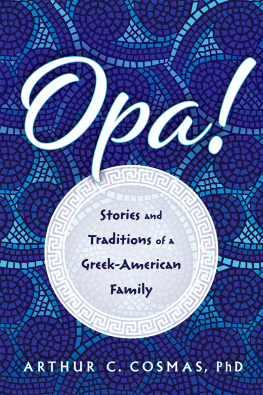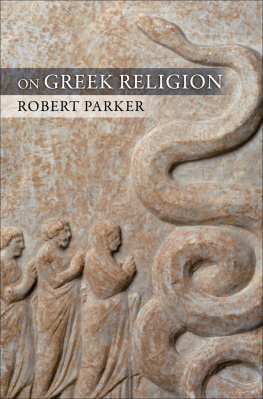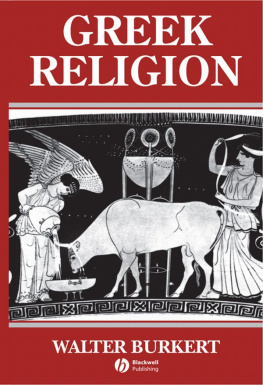ROUTLEDGE LIBRARY EDITIONS: SOCIOLOGY OF RELIGION
Volume 12
THE RELIGION OF ETHNICITY
THE RELIGION OF ETHNICITY
Belief and Belonging in a Greek-American Community
GARY A. KUNKELMAN
First published in 1990 by Garland Publishing
This edition first published in 2019
by Routledge
2 Park Square, Milton Park, Abingdon, Oxon OX14 4RN
and by Routledge
52 Vanderbilt Avenue, New York, NY 10017
Routledge is an imprint of the Taylor & Francis Group, an informa business
1990 Gary A. Kunkelman
All rights reserved. No part of this book may be reprinted or reproduced or utilised in any form or by any electronic, mechanical, or other means, now known or hereafter invented, including photocopying and recording, or in any information storage or retrieval system, without permission in writing from the publishers.
Trademark notice: Product or corporate names may be trademarks or registered trademarks, and are used only for identification and explanation without intent to infringe.
British Library Cataloguing in Publication Data
A catalogue record for this book is available from the British Library
ISBN: 978-0-367-02386-7 (Set)
ISBN: 978-0-429-02545-7 (Set) (ebk)
ISBN: 978-0-367-08573-5 (Volume 12) (hbk)
ISBN: 978-0-367-08575-9 (Volume 12) (pbk)
ISBN: 978-0-429-02309-5 (Volume 12) (ebk)
Publishers Note
The publisher has gone to great lengths to ensure the quality of this reprint but points out that some imperfections in the original copies may be apparent.
Disclaimer
The publisher has made every effort to trace copyright holders and would welcome correspondence from those they have been unable to trace.
THE RELIGION OF ETHNICITY
Belief and Belonging in a Greek-American Community
Gary A. Kunkelman
Copyright 1990 by Gary A. Kunkelman
All Rights Reserved
Library of Congress Cataloging-in-Publication Data
Kunkelman, Gary A.
The religion of ethnicity: belief and belonging in a Greek-American community/Gary A. Kunkelman.
p. cm. (European immigrants and American society)
Includes bibliographical references (p.)
ISBN 0-8240-0277-6 (alk. paper)
1. Greek AmericansEthnic identity. 2. Greek AmericansReligion. I. Title. II. Series.
E184.G7K96 1990
305.8893073dc20903508
Printed on acid-free, 250-year-life paper.
Manufactured in the United States of America
Design by
Julie Threlkeld
TO MELISSA
of the fourth generation
Acknowledgers, it seems, feel compelled to protest that there simply isnt room enough to give everyone their due. The dilemma, I suspect, isnt so much one of limited space as it is the desire to include everyone-- and the possibility of overlooking someone. At reckoning time, when you come to realize how many people really have contributed in one way or another, you also come to understand why the convention has proven so enduring.
A study like this, which masks the community, compounds the problem-- for it also poses the possibility of embarrassing by inclusion. For a number of reasons, most of them deeply imbedded in Greek-American culture, many of the players are best left unspecified. To them, I sincerely hope this effort is illuminating rather than discomforting. And I trust the people of the community will view this work not as a criticism- for it isnt- but as an exercise in the tradition of Hellenisms most enduring legacy: that of arriving at understanding through free and open inquiry. To the individuals in Bellevue who have been a part of this, in whatever way, let me simply say thank you for your help and many kindnesses.
Then there are those who both can be mentioned and whose contributions were truly central to this project. Murray G. Murphey was, in a very real sense, responsible tor this study. It was Dr. Murphey who first prompted a look at this community, who encouraged me to explore it further, and who kindly consented to direct this project. But even before that, his courses on American philosophy and world views led me to an appreciation of how fundamentally American culture has been shaped by religious thought and institutions. Sharing in generation of that lightning bolt was Mel Hammarberg, also of the American Civilization Department. My thanks to him, as well, for reading the manuscript. Mike Zuckerman of Penns History Department was instrumental in helping to focus and refine ideas; his observations could be the basis for any number of future studies. Liz Sterner read this paper more times than any human being should be asked to. Her editing was and always is top-notch. Michele Hill, too, certainly deserves thanks for her masterful preparation of the manuscript. A very special thanks is due to my wife, Kathy, and her family. Representing three generations of Greek-Americans, they provided insights, observations and introductions that made this study possible.
When this study was completed in 1986, the Greek-American community in Bellevue was grappling with a difficult and delicate task: that of fashioning an ethnicity American enough not to interfere with mainstream upper middle class status, yet Greek enough to ensure ethnic distinctiveness. While not an easy trick to pull off, the challenge wasnt a particularly novel one; Bellevues Greek-Americans had been doing precisely that since the communitys earliest days. Through a largely implicit process, they have structured a cultural system that maintains their ethnicity despite continual change that objectively brings them closer to mainstream American. (While it must remain only a suggestion, a similar process may well be a hallmark of any viable ethnic unit).
Recent years have underscored the theme that ethnicity (and for the Greeks, religion as a central component of it) is anything but static. An enduring ethnicity is a dynamic ethnicity. It represents a process of tension and contention as institutions and cultural forces are focused on the largely implicit task of maintaining ethnicity within the overarching framework of the host culture. While we tend to think of ethnic cultures as traditional cultures doggedly maintained, this characterization doesnt hold water. The traditional definers of ethnicity-- the cultural material of attitudes, beliefs, folkways- have proven remarkably fluid and open to change (again, at least in this community).
Building on this, the study suggests that cultural material plays an essentially symbolic role in setting the group apart. It isnt necessary for cultural material to be unique or even different from the host cultures, as long as group members embrace it as theirs. That is, ethnicity is ultimately group defined; it is what members of the ethnic group agree it should be. This, of course, gives a certain tenuousness to it all. The cultural solutions fashioned toward the end of ethnic maintenance are never more than solutions of the moment. Yet it is this very flexibility that allows an alien ethnic culture to retain its vitality and distinctiveness in a notoriously incorporative larger culture.








